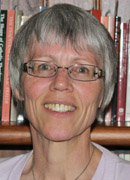By Barb Arland-Fye

In two weeks my younger son Patrick leaves home to attend Kirkwood Community College in Cedar Rapids, but the family member most affected by approaching empty nest syndrome is our older son, Colin. And he hasn’t lived at home in nearly eight years!
When he called the other night, my husband Steve asked me whether I’d noticed that Colin had been calling more frequently. He doesn’t initially ask to talk to Patrick, but every conversation includes this question: What’s Patrick doing? Is he home now? Can I talk to him? More recently Colin has invited Patrick to overnight visits and to pool parties.
Colin’s undying adoration for Patrick seems puzzling to me because his younger brother hasn’t always reciprocated. Although he loves his brother fiercely, Patrick, who is nearly eight years younger, has conflicting emotions about their relationship.
He has always feared rejection by his peers if they learned he has a brother with autism. While some students at Patrick’s high school received accolades for their inclusion of students with disabilities, Patrick also heard students in the cafeteria make cruel remarks or shun peers who are different.
When our family attended a public event, went to Mass or a restaurant, Patrick advised Colin on appropriate behavior and tried to squelch his quirks, such as flapping his hands. Until recently, I hadn’t realized how much my modeling had influenced Patrick’s reactions.
From the time Colin was diagnosed with autism as a preschooler, I strived to make him fit in with his peers and quickly corrected behavior which didn’t match that of other children. When he flapped his hands and rocked back and forth, I told him to stop even though that motion helped him deal with excitement or anxiety.
Children learn what they live, and Patrick picked up on my social cues, even the wrong ones.
Patrick confided in me last week that he is trying to refrain from correcting Colin. After receiving a pep talk from some friends about acceptance, Patrick realized that he needs to show Colin acceptance, and to not worry about what other people think about his brother’s idiosyncrasies.
But he still longs for his older brother to experience the success that his friends’ older brothers experience. He wants to be able to share Colin’s accomplishments with friends and acquaintances.
Fresh from a visit to L’Arche communities in Clinton, Iowa, and in France — where people with and without intellectual disabilities share life together — I reflected with Patrick on the value of every individual’s life.
Jean Vanier, who “began” L’Arche, told me during our interview in France that “what people need most is not that they’re doing good things, that they’re independent … that isn’t what brings the most joy … it’s the quality of friendship. Then I know I am loved. Then I know I am someone.”
Cardinal Francis George of Chicago, in his most recent column for the Catholic New World, wrote about ministry with and for people with disabilities that reinforced this message about the value of each individual.
“In the church, everyone gives and everyone receives. Everyone serves and everyone is served. This is the Gospel sense of inclusion. Everyone acts not to show what they can accomplish but to show what God does in using them for his purposes … Spiritual results, however, fall outside of normal measurements; they are measured by God” (July 31-Aug. 3, Catholic New World).
Colin called the other night and asked to talk with Patrick. I noticed a change in the tone of Patrick’s voice. He asked what Colin had been up to and expressed genuine interest in his brother’s response. Just as important, Patrick offered assurances that he will come home for visits and that made Colin’s day.







